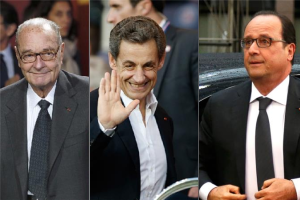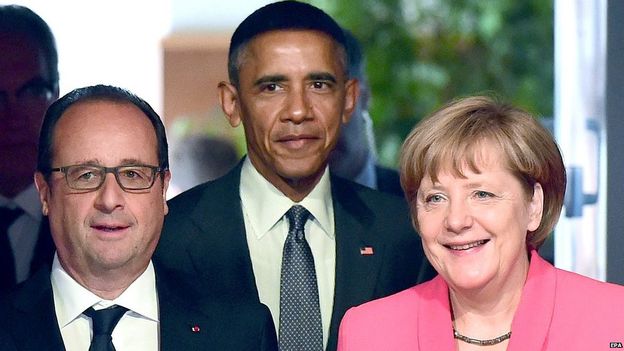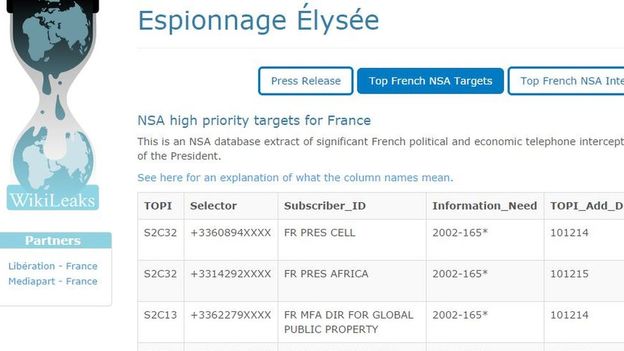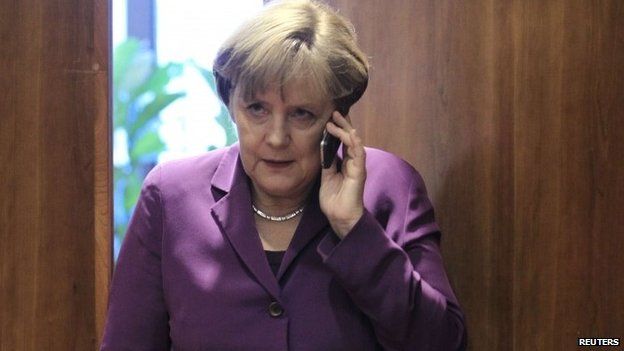WikiLeaks: US spied on three French presidents
The US National Security Agency (NSA) spied on French Presidents Jacques Chirac, Nicolas Sarkozy and Francois Hollande in 2006-12, Wikileaks says.
 The whistleblower website cites "top secret intelligence reports and technical documents" from the NSA. A French official said spying "between allies was unacceptable". Mr Hollande is to discuss the issue with security chiefs. The US would not confirm the veracity of the documents.
The whistleblower website cites "top secret intelligence reports and technical documents" from the NSA. A French official said spying "between allies was unacceptable". Mr Hollande is to discuss the issue with security chiefs. The US would not confirm the veracity of the documents.
In 2013 the NSA was accused of spying on German Chancellor Angela Merkel. On Tuesday, Wikileaks said it began publishing the files under the heading "Espionnage Elysee" - a reference to the French presidential palace. It said the secret files "derive from directly targeted NSA surveillance of the communications" of the three French presidents as well as French ministers and the ambassador to the US.
One of the files, dated 2012, is about Mr Hollande discussing Greece's possible exit from the eurozone. Another one - from 2011 - alleges that Mr Sarkozy was determined to resume peace talks between Israel and the Palestinians, possibly without US involvement.
A file dated 2010 suggests that French officials were aware that the US was spying upon them and intended to complain about it. According to the summary of an intercepted exchange, the French envoy to Washington and Mr Sarkozy's diplomatic adviser discussed Mr Sarkozy's plan to express his "frustration" over US unwillingness to sign a "bilateral intelligence co-operation agreement".
"The main sticking point is the US desire to continue spying on France," the intercept says. It is unclear whether the material comes from data stolen by former NSA contractor Edward Snowden, the security correspondent Gordon Corera says. The Wikileaks files have now been published by France's Liberation newspaper and the Mediapart investigative website.

Wikileaks carried a statement by its founder, Julian Assange, who said: "The French people have a right to know that their elected government is subject to hostile surveillance from a supposed ally. "French readers can expect more timely and important revelations in the near future." Wikileaks spokesperson Kristinn Hrafnsson told that although its revelations of NSA phone tapping against Mrs Merkel had not included any actual content, this time they were producing what he said were secret reports. "It shows the lengths the NSA and the top officials in the US are willing to go," he said.

In response to the alleged leaks, National Security Council spokesman Ned Price said: "We are not going to comment on specific intelligence allegations. "As a general matter, we do not conduct any foreign intelligence surveillance activities unless there is a specific and validated national security purpose. This applies to ordinary citizens and world leaders alike."
He later added: "We are not targeting and will not target the communications of President Hollande. We work closely with France on all matters of international concern, and the French are indispensable partners." The French presidential aide told that Mr Hollande would hold a defence council meeting "to evaluate the nature of the information published by the press on Tuesday evening and to draw useful conclusions".
German anger
The allegation that the US had spied on Germany's Chancellor Merkel arose from documents leaked by Mr Snowden about large-scale US surveillance in 2013. When the allegations were made the White House made no outright denial, but said Mrs Merkel's phone was not being bugged currently and would not be in future.
The alleged spying shocked public opinion in Germany, with Mrs Merkel saying that "spying between friends just isn't on". But German media later reported that Germany's national intelligence agency had spied on top French officials and on the EU's headquarters on behalf of the US. There were also reports that German intelligence had eavesdropped on phone calls by US Secretary of State John Kerry and his predecessor Hillary Clinton. Unnamed German government sources said the calls had been picked up accidentally.

Germany recently dropped its investigation in the alleged tapping of Mrs Merkel's phone, saying there was not enough evidence to justify legal action. In 2013 Brazilian media reported that NSA documents showed the agency had also spied on Brazilian President Dilma Rousseff and President Enrique Pena Nieto of Mexico.
Although initially outraged, President Rousseff later took steps to smooth things over, saying the Obama administration had not been directly responsible. President Obama signed into law new legislation earlier this month that limited the government's ability to collect Americans' telephone data. It replaced an NSA programme - highlighted by Mr Snowden - in which the agency collected personal data en masse.
Axarhöfði 14,
110 Reykjavik, Iceland














